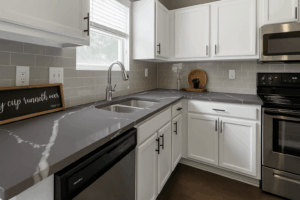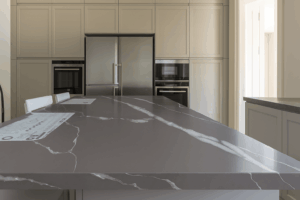Don’t Get Stuck with a Bad Quartz Slab
Quartz is durable, low-maintenance, and comes in several colors and styles. But here’s what most people don’t tell you: not all quartz slabs are created equal.
If you’re remodeling your kitchen and shopping for quartz, you’re probably seeing dozens of options. Some look nearly identical but vary wildly in price. Some fabricators can’t explain where the slab came from. And maybe you’ve heard stories of countertops cracking, discoloring, or looking off just weeks after installation.
That’s because there are real quality differences between slabs, and unless you know what to look for, it’s easy to end up overpaying for something that won’t last. Let’s break it down for you.
How to Tell If a Quartz Slab Is High Quality
What are the signs of a premium-grade quartz countertop?

Not every quartz slab on the market meets the same standard. Just because it looks good in the showroom doesn’t mean it’ll hold up in your kitchen. If you’re investing in new countertops, here’s how to spot the difference between premium-grade quartz and the stuff that cuts corners.
Start with the Resin-to-Quartz Ratio
The main ingredient in a quality slab? Natural quartz crystals, not resin. A premium slab should be around 90–93% natural quartz, with just enough resin to bind the material together.
If the resin content is too high, the slab becomes weaker and more prone to:
- Scratches
- Heat damage
- UV discoloration
Why it matters: Slabs with excess resin tend to warp, fade, or turn yellow, especially in areas exposed to direct sunlight like kitchen islands or countertops near windows.
Look for Color and Pattern Consistency Across the Slab
Quartz is an engineered stone, so it should be consistent. That’s part of its appeal. But lower-grade slabs often show:
- Blotchy color patches
- Inconsistent veining or patterning
- Abrupt changes in tone from one area to another
You want a slab that looks even and cohesive across the surface, not one that forces your fabricator to “cut around” the imperfections.
Thickness and Weight Signal Quality
High-quality quartz slabs are typically 3cm thick, offering better durability and a more substantial feel. The thinner, 2cm slabs often require laminated edges, which can chip or separate over time.
Quick test: Tap on the slab. If it sounds hollow or feels unusually light, it might not be first-choice material. A dense, solid feel is a sign of a quality slab.
Ask About the Manufacturer and Warranty
Not all quartz manufacturers hold themselves to the same quality standards. Trusted brands will:
- Offer a written warranty (often 10+ years)
- Provide detailed care instructions
- Use consistent, traceable manufacturing processes
If your supplier can’t tell you who made the slab or what kind of warranty it comes with, that’s a red flag.
Surface Feel and Finish Matter
Run your hand across the surface. A premium quartz slab feels smooth and flawless, with no gritty spots or irregularities.
Watch out for:
- Rough patches or micro-pits
- Uneven finish or texture
- Inconsistent sheen from one area to the next
Whether you’re going with a polished, honed, or leathered finish, the surface should feel clean, even, and professional.
Red Flags to Watch Out for When Choosing Quartz
What signs suggest a quartz slab might not be worth your money?

Quartz countertops are marketed as low-maintenance and ultra-durable, but that only holds true if you’re starting with a quality quartz slab. Builders and homeowners alike should be on alert for these common warning signs that a slab may be lower grade, poorly made, or not worth the price tag.
1. Vague or Missing Product Info
If your supplier can’t answer basic questions, like who manufactured the slab, what the resin content is, or whether a warranty exists, that’s a dealbreaker.
Reputable quartz manufacturers provide:
- Clear spec sheets
- Consistent pigment and pattern guidelines
- Installation requirements and care instructions
No info means no accountability. And without that documentation, you’re likely looking at a mid-grade quartz at best.
2. Too-Good-to-Be-True Pricing
Everyone wants to save money, but quartz isn’t something to bargain hunt.
Suspiciously low prices usually mean:
- The slab is not first-choice material (could be an offcut, second, or overstock)
- It was mass-produced with high resin content and minimal quality control
- The color or pattern may fade or stain easily, especially in busy kitchen countertop zones
You might save a few hundred dollars now, but you’ll spend more later dealing with discoloration, wear, or replacement.
3. Imperfections That Don’t Belong
Natural stone has variation; quartz shouldn’t. Quartz is an engineered surface, so anything outside of the expected pattern is a red flag.
Watch for:
- Random pits, hairline cracks, or dull streaks
- Inconsistent pigment or tone
- Areas where the pattern looks blurry or broken
These flaws often come from rushed production or poor resin blending, and they tend to show up across the slab, not just in one spot.
4. Poor Fabrication or Installation Work
Even the best quartz countertops can be ruined by sloppy workmanship.
Signs of a poor job include:
- Visible seams that don’t line up across the slab
- Uneven edges or misaligned corners
- Excess glue or filler along edge profiles
A skilled fabricator understands the material, knows how to work with different grades of quartz, and respects the layout of your space.
5. Lack of Guidance During Selection
Choosing quartz shouldn’t feel like a guessing game. If your supplier or fabricator leaves you wandering the showroom or pushes you toward the priciest slab without explanation, that’s not helpful; it’s a red flag.
A good fabricator or showroom rep will:
- Help you compare quartz countertop options
- Explain the differences in durability, color, and pattern
- Walk you through what works best for your kitchen, style, and budget
At the end of the day, you should feel confident you’re selecting the right countertop material — not just reacting to a sales pitch.
Ready to Choose the Right Quartz for Your Project?
Schedule a Consultation with Our Team
Choosing quartz doesn’t have to be confusing or stressful. Whether you’re remodeling your kitchen, building new, or just exploring options, we’ll help you compare materials, understand the differences in quality, and find the right slab for your space.
No pressure. No guesswork. Just real, honest advice, and results that speak for themselves.
FAQs About Quartz Quality and Slab Selection
Does a higher price always mean better quality?
Not always, but if the price is unusually low, it’s worth asking why. A cheaper slab might look fine at first but often comes with higher resin content, inconsistent color, or poor durability.
Premium quartz isn’t about paying for a name, it’s about paying for performance, especially on kitchen countertops that take daily wear and tear.
What does “first choice” quartz mean?
First choice quartz refers to slabs that meet the highest standards. No defects, no irregularities, and consistent color throughout. These are the slabs fabricators prefer to use for highly visible installs, where pattern flow and finish quality really matter. If you want a perfect quartz countertop, this is the grade to ask for.
How can I tell the difference between mid-grade and premium quartz just by looking?
There are a few key factors:
- Color consistency: Premium slabs have an even tone and pattern throughout.
- Thickness: Look for 3cm slabs; they’re stronger and don’t rely on built-up edges.
- Surface finish: Should feel smooth and uniform with no rough patches or dull spots.
- Brand reputation: Trusted manufacturers maintain tighter quality control.
When in doubt, ask to see documentation or compare the slab against others in the same line.
Is it okay to buy quartz online or sight unseen?
Only if you’re working with a trusted fabricator who’s inspected the slab in person. Buying quartz based on a photo can be risky; small differences in pigment or pattern can make a big impact once it’s installed. Whenever possible, selecting quartz in person helps avoid surprises down the line.
Will all quartz resist wear and tear the same way?
No. While quartz countertops are extremely durable, that durability depends on the grade of quartz and how it’s made. Higher-grade quartz holds up better against scratches, stains, and heat, especially with a balanced resin mix and proper fabrication. If you’re installing new quartz counters in a busy kitchen, that quality makes a real difference.

